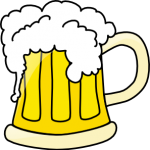Tags

The Icelandic brewing company Ölgerðin celebrated its 100th anniversary yesterday, according to this article on RÚV. It relates a brief history of the company, its founder and its products. It is interesting to note that beer was outlawed in Iceland from 1915 until March 1, 1989 (now known as Beer Day in Iceland), so the beer produced up until then was actually for export, not for local consumption. EDIT: I was informed that light beer (pilsner) with less than 2.25% alcohol was not part of the ban, and so was in fact available locally.
Aldargömul ölgerð – A Century Old Brewery
The word for beer is a well behaved neuter noun 🙂
| öl (n) – beer (ale) | ||
|---|---|---|
| singular | plural | |
| nom | öl | öl |
| acc | öl | öl |
| dat | öli | ölum |
| gen | öls | öla |
Of course the more common word for beer is bjór; the similarity of öl to ale is easy to see.
“Ölgerðin hélt upp á hundrað ára afmæli sitt í dag. Stefán Pálsson sagnfræðingur segir ekki ólíklegt að menn, sem notuðu malt sem magalyf, hafi tekið upp á því að blanda því saman við appelsín, þar sem þeim hafi þótt óviðeigandi að drekka magalyfið með jólamatnum.”
“Ölgerðin celebrated its 100th anniversary today. Historian Stefan Palsson says it is not unlikely that people, who used malt as a stomach remedy, had taken to mixing it with orange drink, since they may have considered it inappropriate to drink the stomach medicine with the Christmas meal.”
You have probably seen the word afmæli before meaning birthday – it is also used for anniversary. Also note the compound magalyf, formed from magi (stomach, belly) and lyf (medicine).
öl·gerð f (-ar,-ir) brewery, brewing halda upp á + acc. celebrate something lyf n (-s,-) medicine taka upp á + dat. get the idea to do something ó·viðeigandi adj inappropriate
There’s an interesting phrase that starts off the second paragraph:
“Mikið vatn hefur runnið til sjávar síðan Tómas Tómasson, stofnandi Ölgerðarinnar, hóf að framleiða íslenskt léttöl í litlu herbergi við Templarasund fyrir hundrað árum, þá 25 ára gamall.”
“A lot of water has flowed to sea since Tomas Tomasson, founder of Ölgerðin, began producing Icelandic light beer in a small room in Templarasund a hundred years ago at the age of 25.”
The word used for sea here is sjár, which I think is just a more literary form of sjór; here it is in the genitive singular form, sjávar. Just thought it was a cool expression; hadn’t seen it before 🙂
| að hefja – to begin, commence | ||
|---|---|---|
| present | past | |
| ég | hef | hóf |
| þú | hefur | hófst |
| það | hefur | hóf |
| við | hefjum | hófum |
| þið | hefjið | hófuð |
| þau | hefja | hófu |
The verb hefja is seen often, especially in reflexive form when saying when something begins or starts:
Flugeldasala hefst í fyrramálið.
Fireworks sales begin tomorrow morning. ( think end of December 🙂 )
There is an expression with the word snið that is seen twice in the article, used to express the size/scale of the operation:
“Framleiðslan var ekki stór í sniðum í fyrstu…”
“Production was not large in scale at first…”
“…byrjaði það smátt í sniðum.”
“…it started out on a small scale.”
“Ölgerðin fór þó ekki að framleiða gosdrykki fyrr en 1930 og 25 árum síðar, árið 1955, leit Egils Appelsínið dagsins ljós. „Og eins og hér, byrjaði það smátt í sniðum. Sextán ára drengur var ráðinn í það að hræra saman efnum og tappa á flöskur. Sá sami piltur, Sigurður Sveinsson, finnur síðan upp Appelsínið 25 árum síðar, 1955, og það verður íslenski þjóðargosdrykkurinn.“”
“However Ölgerðin did not produce soft drinks before 1930, and 25 years later, in 1955, Egils Orange Drink saw the light of day. ‘And just like here, it started out on a small scale. A sixteen year old boy was hired to mix up the ingredients and cap the bottles. That same boy, Sigurður Sveinsson, then invented Appelsín 25 years later in 1955, and it became the Icelandic national soft drink.'”
fram·leiða v (acc) produce, manufacture ráða v (acc/dat) hire, employ hræra v (acc) stir, mix tapp/a v (dat) cap (bottle) finna upp invent
“Stefán segir ekki vitað með neinni vissu hvenær menn fóru að blanda saman malti og appelsíni, það sé þekkt hefð víða í Evrópu að blanda saman léttu öli og gosdrykkjum. Mönnum hafi kannski þótt maltið of dýrt og því gripið til þessa ráðs í sparnaðarskyni.”
“Stefan says it isn’t known with any certainty when people started mixing malt with orange drink, but it was a known custom all over Europe to mix light beer with soda. Perhaps people felt malt was too expensive and resorted to mixing it as a way to make it last longer.”
blanda v (dat) blend, mix hefð f (-ar,-ir) tradition, custom sparnað/ur m (-ar) thrift, economizing
It’s a fairly long article, and I didn’t put it all in here, but this should help a bit. Translate the rest and learn more about Icelandic brewing 🙂
